标签:cluster 导致 condition byte scan cross window log ping
第一步:首先我们构建集群节点目录:
(集群正常运作至少需要三个主节点,不过在刚开始试用集群功能时, 强烈建议使用六个节点: 其中三个为主节点, 而其余三个则是各个主节点的从节点。主节点崩溃,从节点的Redis就会提升为主节点,代替原来的主节点工作,崩溃的主Redis回复工作后,会成为从节点)
拷贝开始下载的 redis 解压后的目录,并修改文件名(比如按集群下 redis 端口命名)如下:
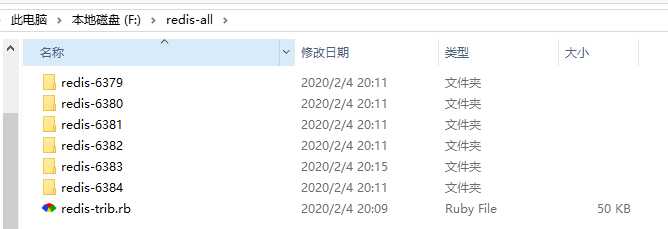
6379、6380、6381、6382、6383、6384 对应的就是后面个节点下启动 redis 的端口。
在节点目录下新建文件,输入(举例在 6380 文件夹下新建文件)
title redis-6380;
redis-server.exe redis.windows.conf
然后保存为 start.bat 下次启动时直接执行该脚本即可。
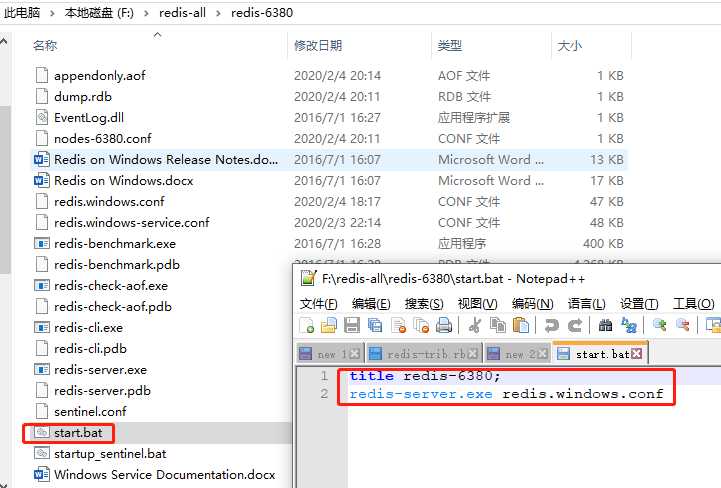
接着分别打开各个文件下的 redis.windows.conf,分别修改如下配置(举例修改 6380 文件下的 redis.window.conf 文件):
port 6380 //修改为与当前文件夹名字一样的端口号
appendonly yes //指定是否在每次更新操作后进行日志记录,Redis在默认情况下是异步的把数据写入磁盘,如果不开启,可能会在断电时导致一段时间内的数据丢失。 yes表示:存储方式,aof,将写操作记录保存到日志中
cluster-enabled yes //开启集群模式
cluster-config-file nodes-6380.conf //保存节点配置,自动创建,自动更新(建议命名时加上端口号)
cluster-node-timeout 15000 //集群超时时间,节点超过这个时间没反应就断定是宕机
注意:在修改配置文件这几项配置时,配置项前面不能有空格,否则启动时会报错(参考下面)
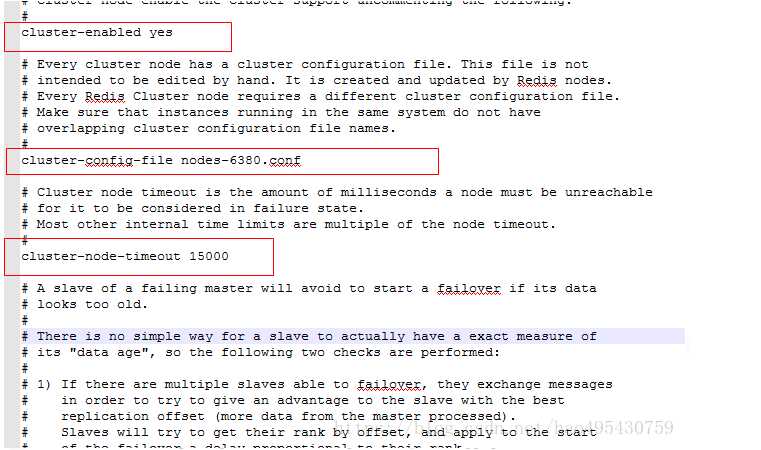
其他文件节点 6379~6384 也修改相应的节点配置信息和建立启动脚本(略)。
第二步:下载Ruby并安装
下载完成后安装,一步步点 next 直到安装完成(安装时勾选3个选项)
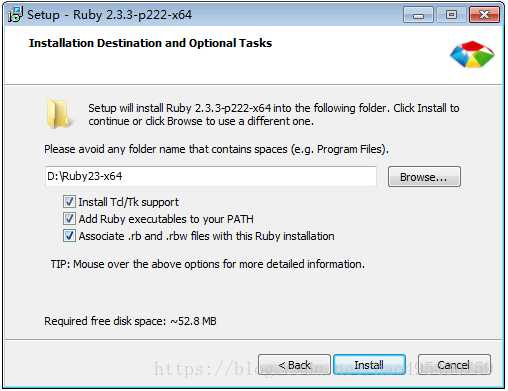
然后对 ruby 进行配置:
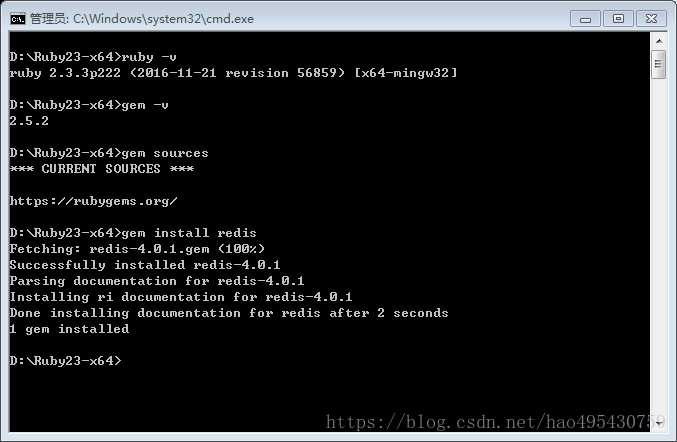
构建集群脚本redis-trib.rb
可以打开 https://raw.githubusercontent.com/MSOpenTech/redis/3.0/src/redis-trib.rb 然后复制里面的内容到本地并保存为 redis-trib.rb;

#!/usr/bin/env ruby # TODO (temporary here, we‘ll move this into the Github issues once # redis-trib initial implementation is completed). # # - Make sure that if the rehashing fails in the middle redis-trib will try # to recover. # - When redis-trib performs a cluster check, if it detects a slot move in # progress it should prompt the user to continue the move from where it # stopped. # - Gracefully handle Ctrl+C in move_slot to prompt the user if really stop # while rehashing, and performing the best cleanup possible if the user # forces the quit. # - When doing "fix" set a global Fix to true, and prompt the user to # fix the problem if automatically fixable every time there is something # to fix. For instance: # 1) If there is a node that pretend to receive a slot, or to migrate a # slot, but has no entries in that slot, fix it. # 2) If there is a node having keys in slots that are not owned by it # fix this condition moving the entries in the same node. # 3) Perform more possibly slow tests about the state of the cluster. # 4) When aborted slot migration is detected, fix it. require ‘rubygems‘ require ‘redis‘ ClusterHashSlots = 16384 def xputs(s) case s[0..2] when ">>>" color="29;1" when "[ER" color="31;1" when "[OK" color="32" when "[FA","***" color="33" else color=nil end color = nil if ENV[‘TERM‘] != "xterm" print "\033[#{color}m" if color print s print "\033[0m" if color print "\n" end class ClusterNode def initialize(addr) s = addr.split(":") if s.length < 2 puts "Invalid IP or Port (given as #{addr}) - use IP:Port format" exit 1 end port = s.pop # removes port from split array ip = s.join(":") # if s.length > 1 here, it‘s IPv6, so restore address @r = nil @info = {} @info[:host] = ip @info[:port] = port @info[:slots] = {} @info[:migrating] = {} @info[:importing] = {} @info[:replicate] = false @dirty = false # True if we need to flush slots info into node. @friends = [] end def friends @friends end def slots @info[:slots] end def has_flag?(flag) @info[:flags].index(flag) end def to_s "#{@info[:host]}:#{@info[:port]}" end def connect(o={}) return if @r print "Connecting to node #{self}: " STDOUT.flush begin @r = Redis.new(:host => @info[:host], :port => @info[:port], :timeout => 60) @r.ping rescue xputs "[ERR] Sorry, can‘t connect to node #{self}" exit 1 if o[:abort] @r = nil end xputs "OK" end def assert_cluster info = @r.info if !info["cluster_enabled"] || info["cluster_enabled"].to_i == 0 xputs "[ERR] Node #{self} is not configured as a cluster node." exit 1 end end def assert_empty if !(@r.cluster("info").split("\r\n").index("cluster_known_nodes:1")) || (@r.info[‘db0‘]) xputs "[ERR] Node #{self} is not empty. Either the node already knows other nodes (check with CLUSTER NODES) or contains some key in database 0." exit 1 end end def load_info(o={}) self.connect nodes = @r.cluster("nodes").split("\n") nodes.each{|n| # name addr flags role ping_sent ping_recv link_status slots split = n.split name,addr,flags,master_id,ping_sent,ping_recv,config_epoch,link_status = split[0..6] slots = split[8..-1] info = { :name => name, :addr => addr, :flags => flags.split(","), :replicate => master_id, :ping_sent => ping_sent.to_i, :ping_recv => ping_recv.to_i, :link_status => link_status } info[:replicate] = false if master_id == "-" if info[:flags].index("myself") @info = @info.merge(info) @info[:slots] = {} slots.each{|s| if s[0..0] == ‘[‘ if s.index("->-") # Migrating slot,dst = s[1..-1].split("->-") @info[:migrating][slot.to_i] = dst elsif s.index("-<-") # Importing slot,src = s[1..-1].split("-<-") @info[:importing][slot.to_i] = src end elsif s.index("-") start,stop = s.split("-") self.add_slots((start.to_i)..(stop.to_i)) else self.add_slots((s.to_i)..(s.to_i)) end } if slots @dirty = false @r.cluster("info").split("\n").each{|e| k,v=e.split(":") k = k.to_sym v.chop! if k != :cluster_state @info[k] = v.to_i else @info[k] = v end } elsif o[:getfriends] @friends << info end } end def add_slots(slots) slots.each{|s| @info[:slots][s] = :new } @dirty = true end def set_as_replica(node_id) @info[:replicate] = node_id @dirty = true end def flush_node_config return if !@dirty if @info[:replicate] begin @r.cluster("replicate",@info[:replicate]) rescue # If the cluster did not already joined it is possible that # the slave does not know the master node yet. So on errors # we return ASAP leaving the dirty flag set, to flush the # config later. return end else new = [] @info[:slots].each{|s,val| if val == :new new << s @info[:slots][s] = true end } @r.cluster("addslots",*new) end @dirty = false end def info_string # We want to display the hash slots assigned to this node # as ranges, like in: "1-5,8-9,20-25,30" # # Note: this could be easily written without side effects, # we use ‘slots‘ just to split the computation into steps. # First step: we want an increasing array of integers # for instance: [1,2,3,4,5,8,9,20,21,22,23,24,25,30] slots = @info[:slots].keys.sort # As we want to aggregate adjacent slots we convert all the # slot integers into ranges (with just one element) # So we have something like [1..1,2..2, ... and so forth. slots.map!{|x| x..x} # Finally we group ranges with adjacent elements. slots = slots.reduce([]) {|a,b| if !a.empty? && b.first == (a[-1].last)+1 a[0..-2] + [(a[-1].first)..(b.last)] else a + [b] end } # Now our task is easy, we just convert ranges with just one # element into a number, and a real range into a start-end format. # Finally we join the array using the comma as separator. slots = slots.map{|x| x.count == 1 ? x.first.to_s : "#{x.first}-#{x.last}" }.join(",") role = self.has_flag?("master") ? "M" : "S" if self.info[:replicate] and @dirty is = "S: #{self.info[:name]} #{self.to_s}" else is = "#{role}: #{self.info[:name]} #{self.to_s}\n"+ " slots:#{slots} (#{self.slots.length} slots) "+ "#{(self.info[:flags]-["myself"]).join(",")}" end if self.info[:replicate] is += "\n replicates #{info[:replicate]}" elsif self.has_flag?("master") && self.info[:replicas] is += "\n #{info[:replicas].length} additional replica(s)" end is end # Return a single string representing nodes and associated slots. # TODO: remove slaves from config when slaves will be handled # by Redis Cluster. def get_config_signature config = [] @r.cluster("nodes").each_line{|l| s = l.split slots = s[8..-1].select {|x| x[0..0] != "["} next if slots.length == 0 config << s[0]+":"+(slots.sort.join(",")) } config.sort.join("|") end def info @info end def is_dirty? @dirty end def r @r end end class RedisTrib def initialize @nodes = [] @fix = false @errors = [] end def check_arity(req_args, num_args) if ((req_args > 0 and num_args != req_args) || (req_args < 0 and num_args < req_args.abs)) xputs "[ERR] Wrong number of arguments for specified sub command" exit 1 end end def add_node(node) @nodes << node end def cluster_error(msg) @errors << msg xputs msg end def get_node_by_name(name) @nodes.each{|n| return n if n.info[:name] == name.downcase } return nil end # This function returns the master that has the least number of replicas # in the cluster. If there are multiple masters with the same smaller # number of replicas, one at random is returned. def get_master_with_least_replicas masters = @nodes.select{|n| n.has_flag? "master"} sorted = masters.sort{|a,b| a.info[:replicas].length <=> b.info[:replicas].length } sorted[0] end def check_cluster xputs ">>> Performing Cluster Check (using node #{@nodes[0]})" show_nodes check_config_consistency check_open_slots check_slots_coverage end # Merge slots of every known node. If the resulting slots are equal # to ClusterHashSlots, then all slots are served. def covered_slots slots = {} @nodes.each{|n| slots = slots.merge(n.slots) } slots end def check_slots_coverage xputs ">>> Check slots coverage..." slots = covered_slots if slots.length == ClusterHashSlots xputs "[OK] All #{ClusterHashSlots} slots covered." else cluster_error "[ERR] Not all #{ClusterHashSlots} slots are covered by nodes." fix_slots_coverage if @fix end end def check_open_slots xputs ">>> Check for open slots..." open_slots = [] @nodes.each{|n| if n.info[:migrating].size > 0 cluster_error "[WARNING] Node #{n} has slots in migrating state (#{n.info[:migrating].keys.join(",")})." open_slots += n.info[:migrating].keys elsif n.info[:importing].size > 0 cluster_error "[WARNING] Node #{n} has slots in importing state (#{n.info[:importing].keys.join(",")})." open_slots += n.info[:importing].keys end } open_slots.uniq! if open_slots.length > 0 xputs "[WARNING] The following slots are open: #{open_slots.join(",")}" end if @fix open_slots.each{|slot| fix_open_slot slot} end end def nodes_with_keys_in_slot(slot) nodes = [] @nodes.each{|n| nodes << n if n.r.cluster("getkeysinslot",slot,1).length > 0 } nodes end def fix_slots_coverage not_covered = (0...ClusterHashSlots).to_a - covered_slots.keys xputs ">>> Fixing slots coverage..." xputs "List of not covered slots: " + not_covered.join(",") # For every slot, take action depending on the actual condition: # 1) No node has keys for this slot. # 2) A single node has keys for this slot. # 3) Multiple nodes have keys for this slot. slots = {} not_covered.each{|slot| nodes = nodes_with_keys_in_slot(slot) slots[slot] = nodes xputs "Slot #{slot} has keys in #{nodes.length} nodes: #{nodes.join}" } none = slots.select {|k,v| v.length == 0} single = slots.select {|k,v| v.length == 1} multi = slots.select {|k,v| v.length > 1} # Handle case "1": keys in no node. if none.length > 0 xputs "The folowing uncovered slots have no keys across the cluster:" xputs none.keys.join(",") yes_or_die "Fix these slots by covering with a random node?" none.each{|slot,nodes| node = @nodes.sample xputs ">>> Covering slot #{slot} with #{node}" node.r.cluster("addslots",slot) } end # Handle case "2": keys only in one node. if single.length > 0 xputs "The folowing uncovered slots have keys in just one node:" puts single.keys.join(",") yes_or_die "Fix these slots by covering with those nodes?" single.each{|slot,nodes| xputs ">>> Covering slot #{slot} with #{nodes[0]}" nodes[0].r.cluster("addslots",slot) } end # Handle case "3": keys in multiple nodes. if multi.length > 0 xputs "The folowing uncovered slots have keys in multiple nodes:" xputs multi.keys.join(",") yes_or_die "Fix these slots by moving keys into a single node?" multi.each{|slot,nodes| xputs ">>> Covering slot #{slot} moving keys to #{nodes[0]}" # TODO # 1) Set all nodes as "MIGRATING" for this slot, so that we # can access keys in the hash slot using ASKING. # 2) Move everything to node[0] # 3) Clear MIGRATING from nodes, and ADDSLOTS the slot to # node[0]. raise "TODO: Work in progress" } end end # Return the owner of the specified slot def get_slot_owner(slot) @nodes.each{|n| n.slots.each{|s,_| return n if s == slot } } nil end # Slot ‘slot‘ was found to be in importing or migrating state in one or # more nodes. This function fixes this condition by migrating keys where # it seems more sensible. def fix_open_slot(slot) puts ">>> Fixing open slot #{slot}" # Try to obtain the current slot owner, according to the current # nodes configuration. owner = get_slot_owner(slot) # If there is no slot owner, set as owner the slot with the biggest # number of keys, among the set of migrating / importing nodes. if !owner xputs "*** Fix me, some work to do here." # Select owner... # Use ADDSLOTS to assign the slot. exit 1 end migrating = [] importing = [] @nodes.each{|n| next if n.has_flag? "slave" if n.info[:migrating][slot] migrating << n elsif n.info[:importing][slot] importing << n elsif n.r.cluster("countkeysinslot",slot) > 0 && n != owner xputs "*** Found keys about slot #{slot} in node #{n}!" importing << n end } puts "Set as migrating in: #{migrating.join(",")}" puts "Set as importing in: #{importing.join(",")}" # Case 1: The slot is in migrating state in one slot, and in # importing state in 1 slot. That‘s trivial to address. if migrating.length == 1 && importing.length == 1 move_slot(migrating[0],importing[0],slot,:verbose=>true,:fix=>true) # Case 2: There are multiple nodes that claim the slot as importing, # they probably got keys about the slot after a restart so opened # the slot. In this case we just move all the keys to the owner # according to the configuration. elsif migrating.length == 0 && importing.length > 0 xputs ">>> Moving all the #{slot} slot keys to its owner #{owner}" importing.each {|node| next if node == owner move_slot(node,owner,slot,:verbose=>true,:fix=>true,:cold=>true) xputs ">>> Setting #{slot} as STABLE in #{node}" node.r.cluster("setslot",slot,"stable") } # Case 3: There are no slots claiming to be in importing state, but # there is a migrating node that actually don‘t have any key. We # can just close the slot, probably a reshard interrupted in the middle. elsif importing.length == 0 && migrating.length == 1 && migrating[0].r.cluster("getkeysinslot",slot,10).length == 0 migrating[0].r.cluster("setslot",slot,"stable") else xputs "[ERR] Sorry, Redis-trib can‘t fix this slot yet (work in progress). Slot is set as migrating in #{migrating.join(",")}, as importing in #{importing.join(",")}, owner is #{owner}" end end # Check if all the nodes agree about the cluster configuration def check_config_consistency if !is_config_consistent? cluster_error "[ERR] Nodes don‘t agree about configuration!" else xputs "[OK] All nodes agree about slots configuration." end end def is_config_consistent? signatures=[] @nodes.each{|n| signatures << n.get_config_signature } return signatures.uniq.length == 1 end def wait_cluster_join print "Waiting for the cluster to join" while !is_config_consistent? print "." STDOUT.flush sleep 1 end print "\n" end def alloc_slots nodes_count = @nodes.length masters_count = @nodes.length / (@replicas+1) masters = [] # The first step is to split instances by IP. This is useful as # we‘ll try to allocate master nodes in different physical machines # (as much as possible) and to allocate slaves of a given master in # different physical machines as well. # # This code assumes just that if the IP is different, than it is more # likely that the instance is running in a different physical host # or at least a different virtual machine. ips = {} @nodes.each{|n| ips[n.info[:host]] = [] if !ips[n.info[:host]] ips[n.info[:host]] << n } # Select master instances puts "Using #{masters_count} masters:" interleaved = [] stop = false while not stop do # Take one node from each IP until we run out of nodes # across every IP. ips.each do |ip,nodes| if nodes.empty? # if this IP has no remaining nodes, check for termination if interleaved.length == nodes_count # stop when ‘interleaved‘ has accumulated all nodes stop = true next end else # else, move one node from this IP to ‘interleaved‘ interleaved.push nodes.shift end end end masters = interleaved.slice!(0, masters_count) nodes_count -= masters.length masters.each{|m| puts m} # Alloc slots on masters slots_per_node = ClusterHashSlots.to_f / masters_count first = 0 cursor = 0.0 masters.each_with_index{|n,masternum| last = (cursor+slots_per_node-1).round if last > ClusterHashSlots || masternum == masters.length-1 last = ClusterHashSlots-1 end last = first if last < first # Min step is 1. n.add_slots first..last first = last+1 cursor += slots_per_node } # Select N replicas for every master. # We try to split the replicas among all the IPs with spare nodes # trying to avoid the host where the master is running, if possible. # # Note we loop two times. The first loop assigns the requested # number of replicas to each master. The second loop assigns any # remaining instances as extra replicas to masters. Some masters # may end up with more than their requested number of replicas, but # all nodes will be used. assignment_verbose = false [:requested,:unused].each do |assign| masters.each do |m| assigned_replicas = 0 while assigned_replicas < @replicas break if nodes_count == 0 if assignment_verbose if assign == :requested puts "Requesting total of #{@replicas} replicas " "(#{assigned_replicas} replicas assigned " "so far with #{nodes_count} total remaining)." elsif assign == :unused puts "Assigning extra instance to replication " "role too (#{nodes_count} remaining)." end end # Return the first node not matching our current master node = interleaved.find{|n| n.info[:host] != m.info[:host]} # If we found a node, use it as a best-first match. # Otherwise, we didn‘t find a node on a different IP, so we # go ahead and use a same-IP replica. if node slave = node interleaved.delete node else slave = interleaved.shift end slave.set_as_replica(m.info[:name]) nodes_count -= 1 assigned_replicas += 1 puts "Adding replica #{slave} to #{m}" # If we are in the "assign extra nodes" loop, # we want to assign one extra replica to each # master before repeating masters. # This break lets us assign extra replicas to masters # in a round-robin way. break if assign == :unused end end end end def flush_nodes_config @nodes.each{|n| n.flush_node_config } end def show_nodes @nodes.each{|n| xputs n.info_string } end # Redis Cluster config epoch collision resolution code is able to eventually # set a different epoch to each node after a new cluster is created, but # it is slow compared to assign a progressive config epoch to each node # before joining the cluster. However we do just a best-effort try here # since if we fail is not a problem. def assign_config_epoch config_epoch = 1 @nodes.each{|n| begin n.r.cluster("set-config-epoch",config_epoch) rescue end config_epoch += 1 } end def join_cluster # We use a brute force approach to make sure the node will meet # each other, that is, sending CLUSTER MEET messages to all the nodes # about the very same node. # Thanks to gossip this information should propagate across all the # cluster in a matter of seconds. first = false @nodes.each{|n| if !first then first = n.info; next; end # Skip the first node n.r.cluster("meet",first[:host],first[:port]) } end def yes_or_die(msg) print "#{msg} (type ‘yes‘ to accept): " STDOUT.flush if !(STDIN.gets.chomp.downcase == "yes") xputs "*** Aborting..." exit 1 end end def load_cluster_info_from_node(nodeaddr) node = ClusterNode.new(nodeaddr) node.connect(:abort => true) node.assert_cluster node.load_info(:getfriends => true) add_node(node) node.friends.each{|f| next if f[:flags].index("noaddr") || f[:flags].index("disconnected") || f[:flags].index("fail") fnode = ClusterNode.new(f[:addr]) fnode.connect() next if !fnode.r begin fnode.load_info() add_node(fnode) rescue => e xputs "[ERR] Unable to load info for node #{fnode}" end } populate_nodes_replicas_info end # This function is called by load_cluster_info_from_node in order to # add additional information to every node as a list of replicas. def populate_nodes_replicas_info # Start adding the new field to every node. @nodes.each{|n| n.info[:replicas] = [] } # Populate the replicas field using the replicate field of slave # nodes. @nodes.each{|n| if n.info[:replicate] master = get_node_by_name(n.info[:replicate]) if !master xputs "*** WARNING: #{n} claims to be slave of unknown node ID #{n.info[:replicate]}." else master.info[:replicas] << n end end } end # Given a list of source nodes return a "resharding plan" # with what slots to move in order to move "numslots" slots to another # instance. def compute_reshard_table(sources,numslots) moved = [] # Sort from bigger to smaller instance, for two reasons: # 1) If we take less slots than instances it is better to start # getting from the biggest instances. # 2) We take one slot more from the first instance in the case of not # perfect divisibility. Like we have 3 nodes and need to get 10 # slots, we take 4 from the first, and 3 from the rest. So the # biggest is always the first. sources = sources.sort{|a,b| b.slots.length <=> a.slots.length} source_tot_slots = sources.inject(0) {|sum,source| sum+source.slots.length } sources.each_with_index{|s,i| # Every node will provide a number of slots proportional to the # slots it has assigned. n = (numslots.to_f/source_tot_slots*s.slots.length) if i == 0 n = n.ceil else n = n.floor end s.slots.keys.sort[(0...n)].each{|slot| if moved.length < numslots moved << {:source => s, :slot => slot} end } } return moved end def show_reshard_table(table) table.each{|e| puts " Moving slot #{e[:slot]} from #{e[:source].info[:name]}" } end # Move slots between source and target nodes using MIGRATE. # # Options: # :verbose -- Print a dot for every moved key. # :fix -- We are moving in the context of a fix. Use REPLACE. # :cold -- Move keys without opening / reconfiguring the nodes. def move_slot(source,target,slot,o={}) # We start marking the slot as importing in the destination node, # and the slot as migrating in the target host. Note that the order of # the operations is important, as otherwise a client may be redirected # to the target node that does not yet know it is importing this slot. print "Moving slot #{slot} from #{source} to #{target}: "; STDOUT.flush if !o[:cold] target.r.cluster("setslot",slot,"importing",source.info[:name]) source.r.cluster("setslot",slot,"migrating",target.info[:name]) end # Migrate all the keys from source to target using the MIGRATE command while true keys = source.r.cluster("getkeysinslot",slot,10) break if keys.length == 0 keys.each{|key| begin source.r.client.call(["migrate",target.info[:host],target.info[:port],key,0,15000]) rescue => e if o[:fix] && e.to_s =~ /BUSYKEY/ xputs "*** Target key #{key} exists. Replacing it for FIX." source.r.client.call(["migrate",target.info[:host],target.info[:port],key,0,15000,:replace]) else puts "" xputs "[ERR] #{e}" exit 1 end end print "." if o[:verbose] STDOUT.flush } end puts # Set the new node as the owner of the slot in all the known nodes. if !o[:cold] @nodes.each{|n| n.r.cluster("setslot",slot,"node",target.info[:name]) } end end # redis-trib subcommands implementations def check_cluster_cmd(argv,opt) load_cluster_info_from_node(argv[0]) check_cluster end def fix_cluster_cmd(argv,opt) @fix = true load_cluster_info_from_node(argv[0]) check_cluster end def reshard_cluster_cmd(argv,opt) load_cluster_info_from_node(argv[0]) check_cluster if @errors.length != 0 puts "*** Please fix your cluster problems before resharding" exit 1 end # Get number of slots if opt[‘slots‘] numslots = opt[‘slots‘].to_i else numslots = 0 while numslots <= 0 or numslots > ClusterHashSlots print "How many slots do you want to move (from 1 to #{ClusterHashSlots})? " numslots = STDIN.gets.to_i end end # Get the target instance if opt[‘to‘] target = get_node_by_name(opt[‘to‘]) if !target || target.has_flag?("slave") xputs "*** The specified node is not known or not a master, please retry." exit 1 end else target = nil while not target print "What is the receiving node ID? " target = get_node_by_name(STDIN.gets.chop) if !target || target.has_flag?("slave") xputs "*** The specified node is not known or not a master, please retry." target = nil end end end # Get the source instances sources = [] if opt[‘from‘] opt[‘from‘].split(‘,‘).each{|node_id| if node_id == "all" sources = "all" break end src = get_node_by_name(node_id) if !src || src.has_flag?("slave") xputs "*** The specified node is not known or is not a master, please retry." exit 1 end sources << src } else xputs "Please enter all the source node IDs." xputs " Type ‘all‘ to use all the nodes as source nodes for the hash slots." xputs " Type ‘done‘ once you entered all the source nodes IDs." while true print "Source node ##{sources.length+1}:" line = STDIN.gets.chop src = get_node_by_name(line) if line == "done" break elsif line == "all" sources = "all" break elsif !src || src.has_flag?("slave") xputs "*** The specified node is not known or is not a master, please retry." elsif src.info[:name] == target.info[:name] xputs "*** It is not possible to use the target node as source node." else sources << src end end end if sources.length == 0 puts "*** No source nodes given, operation aborted" exit 1 end # Handle soures == all. if sources == "all" sources = [] @nodes.each{|n| next if n.info[:name] == target.info[:name] next if n.has_flag?("slave") sources << n } end # Check if the destination node is the same of any source nodes. if sources.index(target) xputs "*** Target node is also listed among the source nodes!" exit 1 end puts "\nReady to move #{numslots} slots." puts " Source nodes:" sources.each{|s| puts " "+s.info_string} puts " Destination node:" puts " #{target.info_string}" reshard_table = compute_reshard_table(sources,numslots) puts " Resharding plan:" show_reshard_table(reshard_table) if !opt[‘yes‘] print "Do you want to proceed with the proposed reshard plan (yes/no)? " yesno = STDIN.gets.chop exit(1) if (yesno != "yes") end reshard_table.each{|e| move_slot(e[:source],target,e[:slot],:verbose=>true) } end # This is an helper function for create_cluster_cmd that verifies if # the number of nodes and the specified replicas have a valid configuration # where there are at least three master nodes and enough replicas per node. def check_create_parameters masters = @nodes.length/(@replicas+1) if masters < 3 puts "*** ERROR: Invalid configuration for cluster creation." puts "*** Redis Cluster requires at least 3 master nodes." puts "*** This is not possible with #{@nodes.length} nodes and #{@replicas} replicas per node." puts "*** At least #{3*(@replicas+1)} nodes are required." exit 1 end end def create_cluster_cmd(argv,opt) opt = {‘replicas‘ => 0}.merge(opt) @replicas = opt[‘replicas‘].to_i xputs ">>> Creating cluster" argv[0..-1].each{|n| node = ClusterNode.new(n) node.connect(:abort => true) node.assert_cluster node.load_info node.assert_empty add_node(node) } check_create_parameters xputs ">>> Performing hash slots allocation on #{@nodes.length} nodes..." alloc_slots show_nodes yes_or_die "Can I set the above configuration?" flush_nodes_config xputs ">>> Nodes configuration updated" xputs ">>> Assign a different config epoch to each node" assign_config_epoch xputs ">>> Sending CLUSTER MEET messages to join the cluster" join_cluster # Give one second for the join to start, in order to avoid that # wait_cluster_join will find all the nodes agree about the config as # they are still empty with unassigned slots. sleep 1 wait_cluster_join flush_nodes_config # Useful for the replicas check_cluster end def addnode_cluster_cmd(argv,opt) xputs ">>> Adding node #{argv[0]} to cluster #{argv[1]}" # Check the existing cluster load_cluster_info_from_node(argv[1]) check_cluster # If --master-id was specified, try to resolve it now so that we # abort before starting with the node configuration. if opt[‘slave‘] if opt[‘master-id‘] master = get_node_by_name(opt[‘master-id‘]) if !master xputs "[ERR] No such master ID #{opt[‘master-id‘]}" end else master = get_master_with_least_replicas xputs "Automatically selected master #{master}" end end # Add the new node new = ClusterNode.new(argv[0]) new.connect(:abort => true) new.assert_cluster new.load_info new.assert_empty first = @nodes.first.info add_node(new) # Send CLUSTER MEET command to the new node xputs ">>> Send CLUSTER MEET to node #{new} to make it join the cluster." new.r.cluster("meet",first[:host],first[:port]) # Additional configuration is needed if the node is added as # a slave. if opt[‘slave‘] wait_cluster_join xputs ">>> Configure node as replica of #{master}." new.r.cluster("replicate",master.info[:name]) end xputs "[OK] New node added correctly." end def delnode_cluster_cmd(argv,opt) id = argv[1].downcase xputs ">>> Removing node #{id} from cluster #{argv[0]}" # Load cluster information load_cluster_info_from_node(argv[0]) # Check if the node exists and is not empty node = get_node_by_name(id) if !node xputs "[ERR] No such node ID #{id}" exit 1 end if node.slots.length != 0 xputs "[ERR] Node #{node} is not empty! Reshard data away and try again." exit 1 end # Send CLUSTER FORGET to all the nodes but the node to remove xputs ">>> Sending CLUSTER FORGET messages to the cluster..." @nodes.each{|n| next if n == node if n.info[:replicate] && n.info[:replicate].downcase == id # Reconfigure the slave to replicate with some other node master = get_master_with_least_replicas xputs ">>> #{n} as replica of #{master}" n.r.cluster("replicate",master.info[:name]) end n.r.cluster("forget",argv[1]) } # Finally shutdown the node xputs ">>> SHUTDOWN the node." node.r.shutdown end def set_timeout_cluster_cmd(argv,opt) timeout = argv[1].to_i if timeout < 100 puts "Setting a node timeout of less than 100 milliseconds is a bad idea." exit 1 end # Load cluster information load_cluster_info_from_node(argv[0]) ok_count = 0 err_count = 0 # Send CLUSTER FORGET to all the nodes but the node to remove xputs ">>> Reconfiguring node timeout in every cluster node..." @nodes.each{|n| begin n.r.config("set","cluster-node-timeout",timeout) n.r.config("rewrite") ok_count += 1 xputs "*** New timeout set for #{n}" rescue => e puts "ERR setting node-timeot for #{n}: #{e}" err_count += 1 end } xputs ">>> New node timeout set. #{ok_count} OK, #{err_count} ERR." end def call_cluster_cmd(argv,opt) cmd = argv[1..-1] cmd[0] = cmd[0].upcase # Load cluster information load_cluster_info_from_node(argv[0]) xputs ">>> Calling #{cmd.join(" ")}" @nodes.each{|n| begin res = n.r.send(*cmd) puts "#{n}: #{res}" rescue => e puts "#{n}: #{e}" end } end def import_cluster_cmd(argv,opt) source_addr = opt[‘from‘] xputs ">>> Importing data from #{source_addr} to cluster #{argv[1]}" use_copy = opt[‘copy‘] use_replace = opt[‘replace‘] # Check the existing cluster. load_cluster_info_from_node(argv[0]) check_cluster # Connect to the source node. xputs ">>> Connecting to the source Redis instance" src_host,src_port = source_addr.split(":") source = Redis.new(:host =>src_host, :port =>src_port) if source.info[‘cluster_enabled‘].to_i == 1 xputs "[ERR] The source node should not be a cluster node." end xputs "*** Importing #{source.dbsize} keys from DB 0" # Build a slot -> node map slots = {} @nodes.each{|n| n.slots.each{|s,_| slots[s] = n } } # Use SCAN to iterate over the keys, migrating to the # right node as needed. cursor = nil while cursor != 0 cursor,keys = source.scan(cursor, :count => 1000) cursor = cursor.to_i keys.each{|k| # Migrate keys using the MIGRATE command. slot = key_to_slot(k) target = slots[slot] print "Migrating #{k} to #{target}: " STDOUT.flush begin cmd = ["migrate",target.info[:host],target.info[:port],k,0,15000] cmd << :copy if use_copy cmd << :replace if use_replace source.client.call(cmd) rescue => e puts e else puts "OK" end } end end def help_cluster_cmd(argv,opt) show_help exit 0 end # Parse the options for the specific command "cmd". # Returns an hash populate with option => value pairs, and the index of # the first non-option argument in ARGV. def parse_options(cmd) idx = 1 ; # Current index into ARGV options={} while idx < ARGV.length && ARGV[idx][0..1] == ‘--‘ if ARGV[idx][0..1] == "--" option = ARGV[idx][2..-1] idx += 1 if ALLOWED_OPTIONS[cmd] == nil || ALLOWED_OPTIONS[cmd][option] == nil puts "Unknown option ‘#{option}‘ for command ‘#{cmd}‘" exit 1 end if ALLOWED_OPTIONS[cmd][option] value = ARGV[idx] idx += 1 else value = true end options[option] = value else # Remaining arguments are not options. break end end # Enforce mandatory options if ALLOWED_OPTIONS[cmd] ALLOWED_OPTIONS[cmd].each {|option,val| if !options[option] && val == :required puts "Option ‘--#{option}‘ is required "+ "for subcommand ‘#{cmd}‘" exit 1 end } end return options,idx end end ################################################################################# # Libraries # # We try to don‘t depend on external libs since this is a critical part # of Redis Cluster. ################################################################################# # This is the CRC16 algorithm used by Redis Cluster to hash keys. # Implementation according to CCITT standards. # # This is actually the XMODEM CRC 16 algorithm, using the # following parameters: # # Name : "XMODEM", also known as "ZMODEM", "CRC-16/ACORN" # Width : 16 bit # Poly : 1021 (That is actually x^16 + x^12 + x^5 + 1) # Initialization : 0000 # Reflect Input byte : False # Reflect Output CRC : False # Xor constant to output CRC : 0000 # Output for "123456789" : 31C3 module RedisClusterCRC16 def RedisClusterCRC16.crc16(bytes) crc = 0 bytes.each_byte{|b| crc = ((crc<<8) & 0xffff) ^ XMODEMCRC16Lookup[((crc>>8)^b) & 0xff] } crc end private XMODEMCRC16Lookup = [ 0x0000,0x1021,0x2042,0x3063,0x4084,0x50a5,0x60c6,0x70e7, 0x8108,0x9129,0xa14a,0xb16b,0xc18c,0xd1ad,0xe1ce,0xf1ef, 0x1231,0x0210,0x3273,0x2252,0x52b5,0x4294,0x72f7,0x62d6, 0x9339,0x8318,0xb37b,0xa35a,0xd3bd,0xc39c,0xf3ff,0xe3de, 0x2462,0x3443,0x0420,0x1401,0x64e6,0x74c7,0x44a4,0x5485, 0xa56a,0xb54b,0x8528,0x9509,0xe5ee,0xf5cf,0xc5ac,0xd58d, 0x3653,0x2672,0x1611,0x0630,0x76d7,0x66f6,0x5695,0x46b4, 0xb75b,0xa77a,0x9719,0x8738,0xf7df,0xe7fe,0xd79d,0xc7bc, 0x48c4,0x58e5,0x6886,0x78a7,0x0840,0x1861,0x2802,0x3823, 0xc9cc,0xd9ed,0xe98e,0xf9af,0x8948,0x9969,0xa90a,0xb92b, 0x5af5,0x4ad4,0x7ab7,0x6a96,0x1a71,0x0a50,0x3a33,0x2a12, 0xdbfd,0xcbdc,0xfbbf,0xeb9e,0x9b79,0x8b58,0xbb3b,0xab1a, 0x6ca6,0x7c87,0x4ce4,0x5cc5,0x2c22,0x3c03,0x0c60,0x1c41, 0xedae,0xfd8f,0xcdec,0xddcd,0xad2a,0xbd0b,0x8d68,0x9d49, 0x7e97,0x6eb6,0x5ed5,0x4ef4,0x3e13,0x2e32,0x1e51,0x0e70, 0xff9f,0xefbe,0xdfdd,0xcffc,0xbf1b,0xaf3a,0x9f59,0x8f78, 0x9188,0x81a9,0xb1ca,0xa1eb,0xd10c,0xc12d,0xf14e,0xe16f, 0x1080,0x00a1,0x30c2,0x20e3,0x5004,0x4025,0x7046,0x6067, 0x83b9,0x9398,0xa3fb,0xb3da,0xc33d,0xd31c,0xe37f,0xf35e, 0x02b1,0x1290,0x22f3,0x32d2,0x4235,0x5214,0x6277,0x7256, 0xb5ea,0xa5cb,0x95a8,0x8589,0xf56e,0xe54f,0xd52c,0xc50d, 0x34e2,0x24c3,0x14a0,0x0481,0x7466,0x6447,0x5424,0x4405, 0xa7db,0xb7fa,0x8799,0x97b8,0xe75f,0xf77e,0xc71d,0xd73c, 0x26d3,0x36f2,0x0691,0x16b0,0x6657,0x7676,0x4615,0x5634, 0xd94c,0xc96d,0xf90e,0xe92f,0x99c8,0x89e9,0xb98a,0xa9ab, 0x5844,0x4865,0x7806,0x6827,0x18c0,0x08e1,0x3882,0x28a3, 0xcb7d,0xdb5c,0xeb3f,0xfb1e,0x8bf9,0x9bd8,0xabbb,0xbb9a, 0x4a75,0x5a54,0x6a37,0x7a16,0x0af1,0x1ad0,0x2ab3,0x3a92, 0xfd2e,0xed0f,0xdd6c,0xcd4d,0xbdaa,0xad8b,0x9de8,0x8dc9, 0x7c26,0x6c07,0x5c64,0x4c45,0x3ca2,0x2c83,0x1ce0,0x0cc1, 0xef1f,0xff3e,0xcf5d,0xdf7c,0xaf9b,0xbfba,0x8fd9,0x9ff8, 0x6e17,0x7e36,0x4e55,0x5e74,0x2e93,0x3eb2,0x0ed1,0x1ef0 ] end # Turn a key name into the corrisponding Redis Cluster slot. def key_to_slot(key) # Only hash what is inside {...} if there is such a pattern in the key. # Note that the specification requires the content that is between # the first { and the first } after the first {. If we found {} without # nothing in the middle, the whole key is hashed as usually. s = key.index "{" if s e = key.index "}",s+1 if e && e != s+1 key = key[s+1..e-1] end end RedisClusterCRC16.crc16(key) % 16384 end ################################################################################# # Definition of commands ################################################################################# COMMANDS={ "create" => ["create_cluster_cmd", -2, "host1:port1 ... hostN:portN"], "check" => ["check_cluster_cmd", 2, "host:port"], "fix" => ["fix_cluster_cmd", 2, "host:port"], "reshard" => ["reshard_cluster_cmd", 2, "host:port"], "add-node" => ["addnode_cluster_cmd", 3, "new_host:new_port existing_host:existing_port"], "del-node" => ["delnode_cluster_cmd", 3, "host:port node_id"], "set-timeout" => ["set_timeout_cluster_cmd", 3, "host:port milliseconds"], "call" => ["call_cluster_cmd", -3, "host:port command arg arg .. arg"], "import" => ["import_cluster_cmd", 2, "host:port"], "help" => ["help_cluster_cmd", 1, "(show this help)"] } ALLOWED_OPTIONS={ "create" => {"replicas" => true}, "add-node" => {"slave" => false, "master-id" => true}, "import" => {"from" => :required, "copy" => false, "replace" => false}, "reshard" => {"from" => true, "to" => true, "slots" => true, "yes" => false} } def show_help puts "Usage: redis-trib <command> <options> <arguments ...>\n\n" COMMANDS.each{|k,v| o = "" puts " #{k.ljust(15)} #{v[2]}" if ALLOWED_OPTIONS[k] ALLOWED_OPTIONS[k].each{|optname,has_arg| puts " --#{optname}" + (has_arg ? " <arg>" : "") } end } puts "\nFor check, fix, reshard, del-node, set-timeout you can specify the host and port of any working node in the cluster.\n" end # Sanity check if ARGV.length == 0 show_help exit 1 end rt = RedisTrib.new cmd_spec = COMMANDS[ARGV[0].downcase] if !cmd_spec puts "Unknown redis-trib subcommand ‘#{ARGV[0]}‘" exit 1 end # Parse options cmd_options,first_non_option = rt.parse_options(ARGV[0].downcase) rt.check_arity(cmd_spec[1],ARGV.length-(first_non_option-1)) # Dispatch rt.send(cmd_spec[0],ARGV[first_non_option..-1],cmd_options)
如下图,与 redis 集群节点保存在同一个文件夹下(比如我所有节点都存放在 redis-all 文件夹下)。
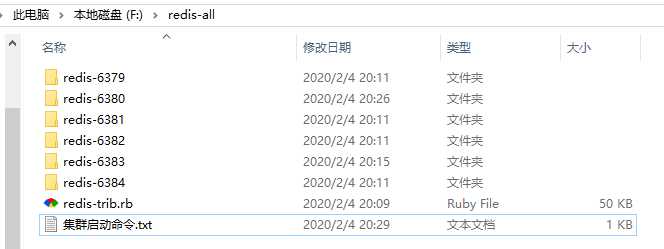
然后依次启动所有集群节点 start.bat
然后 cmd 进入 redis 集群节点目录后,执行: (–replicas 1 表示为集群中的每个主节点创建一个从节点)
redis-trib.rb create --replicas 1 127.0.0.1:6379 127.0.0.1:6380 127.0.0.1:6381 127.0.0.1:6382 127.0.0.1:6383 127.0.0.1:6384
中途会询问是否打印更多详细信息,输入 yes 即可,然后 redis-trib 就会将这份配置应用到集群当中,让各个节点开始互相通讯
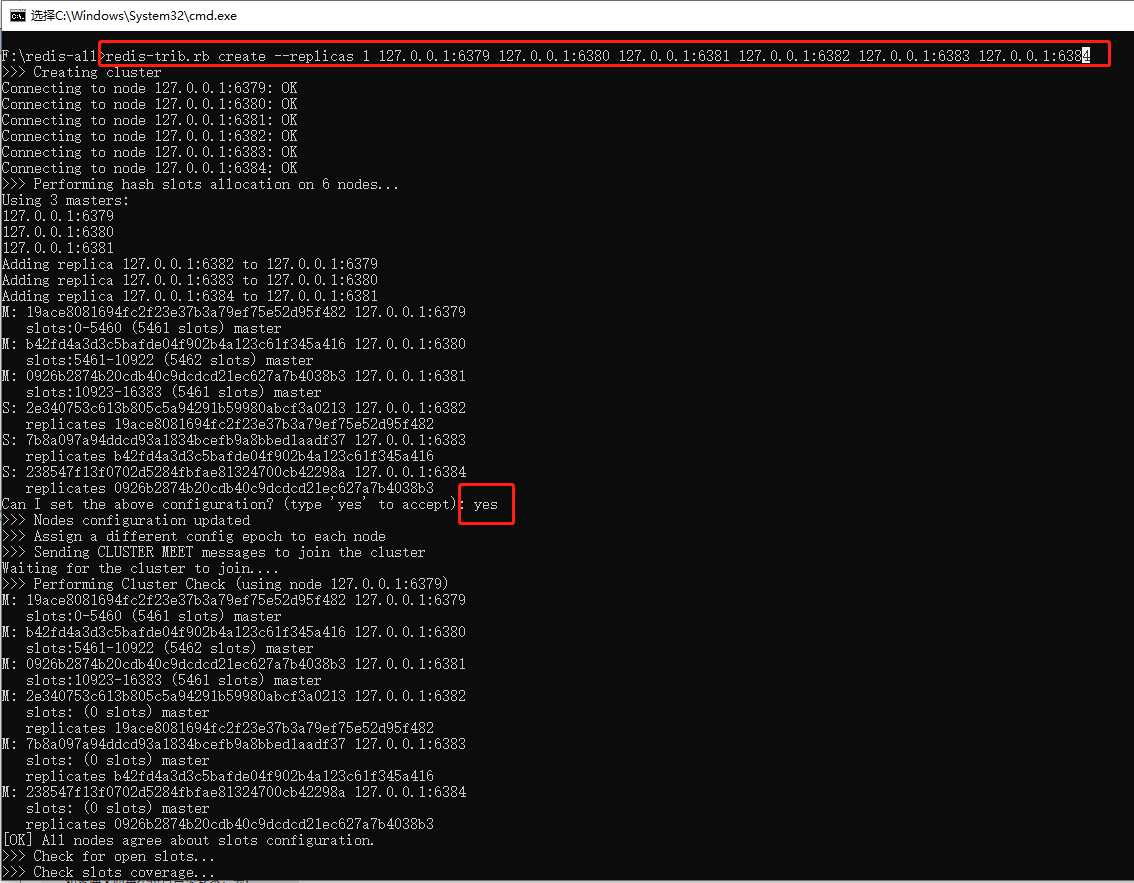
测试是否完成集群部署,我们在一个 redis 服务上 set 数据,看看能否在其他服务获取到,如下图所示:

注意:-c 表示以集群模式登录,否则会报:(error) MOVED
yml 配置如下:
redis: timeout: 6000ms password: # host: 172.16.244.144 # port: 6379 cluster: max-redirects: 3 # 获取失败 最大重定向次数 nodes: 172.16.244.144:7000,172.16.244.144:7001,172.16.244.144:7002,172.16.244.144:7003,172.16.244.144:7004,172.16.244.144:7005 lettuce: pool: max-active: 1000 #连接池最大连接数(使用负值表示没有限制) max-idle: 10 # 连接池中的最大空闲连接 min-idle: 5 # 连接池中的最小空闲连接 max-wait: -1 # 连接池最大阻塞等待时间(使用负值表示没有限制
概念:Redis 集群有 16384 个哈希槽,每个 key 通过 CRC16 校验后对 16384 取模来决定放置哪个槽.集群的每个节点负责一部分hash槽,举个例子,比如当前集群有3个节点,那么:
查看集群信息
redis-cli -p 6379 cluster nodes | grep master
这种结构很容易添加或者删除节点。比如如果我想新添加个节点D,我需要从节点 A, B, C中得部分槽到D上。如果我想移除节点A,需要将A中的槽移到B和C节点上,然后将没有任何槽的A节点从集群中移除即可。由于从一个节点将哈希槽移动到另一个节点并不会停止服务,所以无论添加删除或者改变某个节点的哈希槽的数量都不会造成集群不可用的状态。
为了使在部分节点失败或者大部分节点无法通信的情况下集群仍然可用,所以集群使用了主从复制模型,每个节点都会有 N-1 个复制品。 在我们例子中具有A,B,C三个节点的集群,在没有复制模型的情况下,如果节点B失败了,那么整个集群就会以为缺少 5501-11000 这个范围的槽而不可用。Redis集群做主从备份解决了这个问题
主节点对命令的复制工作发生在返回命令回复之后,因为如果每次处理命令请求都需要等待复制操作完成的话,那么主节点处理命令请求的速度将极大地降低——我们必须在性能和一致性之间做出权衡。注意:Redis 集群可能会在将来提供同步写的方法。Redis 集群另外一种可能会丢失命令的情况是集群出现了网络分区,并且一个客户端与至少包括一个主节点在内的少数实例被孤立。
手动处理solt节点槽重新分片
./redis-trib.rb reshard 127.0.0.1:7000
你想移动多少个槽( 从1 到 16384)? all
添加一个新的主节点
./redis-trib.rb add-node 127.0.0.1:7006 127.0.0.1:7000
添加一个新的从节点
./redis-trib.rb add-node --slave 127.0.0.1:7006 127.0.0.1:7000
移除一个节点
./redis-trib.rb del-node 127.0.0.1:7000 <node-id>
第一个参数是任意一个节点的地址,第二个节点是你想要移除的节点地址。
1)移除主节点【先确保节点里面没有slot】
使用同样的方法移除主节点,不过在移除主节点前,需要确保这个主节点是空的. 如果不是空的,需要将这个节点的数据重新分片到其他主节点上,替代移除主节点的方法是手动执行故障恢复,被移除的主节点会作为一个从节点存在,不过这种情况下不会减少集群节点的数量,也需要重新分片数据.
2)移除从节点直接移除成功
参考博文:
https://blog.csdn.net/hao495430759/article/details/80540407
https://blog.csdn.net/liu0808/article/details/80098568
标签:cluster 导致 condition byte scan cross window log ping
原文地址:https://www.cnblogs.com/jwen1994/p/12261018.html